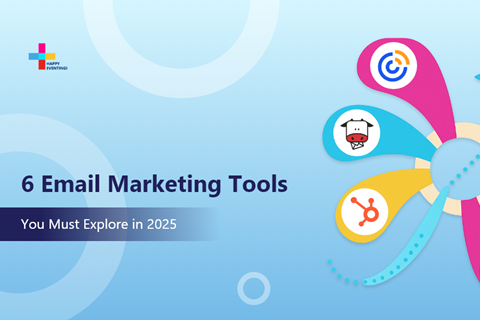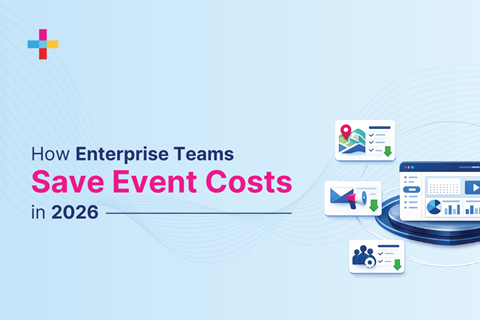Whether it’s the pressure of unexpected tech troubles, the challenge of audience engagement, or creating just the right vibe for your event; event production comes with a lot of complexities.
Still, you have to make your events impactful - to captivate, inspire, and leave a lasting impression on your audience. For successful event production, mastering these intricacies is essential. This guide will help you with the right tools, strategies, and secrets to set the perfect tone for your event, ensuring it's a resounding success that resonates with your audience.
What Is Event Production?
Event production is the process of managing and coordinating every aspect of an event to create a seamless experience. It involves everything from creative design to technical aspects like sound, lighting, video, and special effects. The ultimate meaning of production in event management is to ensure that the event achieves its intended purpose, whether it's educating attendees, fostering community, promoting a brand, or celebrating an occasion. It aims to deliver a memorable experience that deeply connects with the audience and makes the event unforgettable for them.
Event Planning vs. Event Management vs. Event Production
Event Planning, Event Management, and Event Production, while interconnected, serve different roles in the creation of a successful event. Here’s a comprehensive difference between these three terms:
|
Aspect |
Event Planning |
Event Management |
Event Production |
|
Timeline |
Pre-event preparation and conceptualization |
Throughout the event, from setup to conclusion |
Predominantly during the event for technical enhancements |
|
Primary Goal |
Laying the groundwork for the event |
Ensuring smooth operation and troubleshooting |
Creating an impactful and immersive experience
|
|
Main Focus |
Logistics and conceptualization |
Execution and coordination |
Technical and creative execution
|
|
Key Tasks |
Venue selection, scheduling, theme, and vendors |
On-site operations and vendor coordination |
Sound, lighting, video, and special effects
|
Understanding the Event Production Process
The event production process varies based on the type of event: in-person, virtual, or hybrid. Each type requires a different approach. Let’s understand this in detail:
1. In-Person Events
In-person events are gatherings that occur at physical venues, where attendees are physically present at the event location. These events can include conferences, seminars, trade shows, concerts, weddings, and more. 
They offer face-to-face interactions and networking opportunities, providing a tangible and immersive experience for attendees. The planning and execution of these events include:
- Conceptualization:
Conceptualization in in-person events is the initial phase where event planners define the event's purpose, theme, and objectives. It involves brainstorming ideas, setting goals, and envisioning the desired attendee experience.
Key considerations include choosing an appropriate event type (e.g., conference, gala, trade show), selecting a theme that aligns with the event's goals, and outlining the overall concept.
- Venue Selection:
The venue sets the stage for the event's ambiance and functionality. It involves identifying and securing a suitable physical location that aligns with the event's goals, theme, and attendee capacity. Factors such as accessibility, size, layout, amenities, and cost play a vital role in the selection process.
Event planners must also consider the convenience and comfort of attendees, logistical requirements, and the overall atmosphere the venue can provide.
- Logistics Planning:
Logistics planning in in-person events involves the detailed coordination of various operational aspects to ensure a flawless experience for attendees. This includes arranging transportation, managing event schedules, coordinating with vendors, and overseeing on-site logistics.
Effective logistics planning is essential to prevent hiccups and create a well-organized event.
- Technical Setup:
Technical setup in in-person events involves the installation and configuration of audio-visual equipment, lighting, and other technical elements to make sure the event runs smoothly. This includes sound systems, projectors, screens, stage lighting, and any special effects. Ensuring the technical components work perfectly is crucial to delivering a notable event.
- Execution:
Execution in in-person events is the stage where all the planning and preparation come to life. It involves the on-site management of every aspect, from registration and attendee engagement to presentations and logistics coordination.
Event staff ensure that everything runs smoothly, troubleshoot issues, and guarantee a positive experience for attendees. Effective execution is pivotal in delivering a successful in-person event.
2. Virtual Events
Virtual events are digital gatherings that take place entirely online, with attendees participating remotely from their own locations. In 2020, 93% of event planners adapted to virtual events as a necessity. These events leverage web-based platforms to deliver presentations, workshops, conferences, and more. 
Virtual events also offer the advantages of accessibility, cost-effectiveness, and the ability to reach a global audience. The planning and execution of virtual events focus on:
- Platform Selection:
Choosing the right digital platform is essential. Whether it's a webinar tool, a comprehensive virtual event platform, or a simple streaming service, it needs to support your event's format.
Factors to consider include the platform's capabilities for live streaming, interactivity features like chat and polls, and its ability to accommodate the expected number of attendees. Security, ease of use, and technical support are also crucial.
- Content Creation:
Effective content creation is essential to keep remote attendees engaged and provide them with value in the virtual event space. This includes creating presentations, videos, webinars, and interactive content that can be delivered via the virtual event platform. Content must be engaging, relevant, and structured for online consumption.
For example, in a virtual trade show, exhibitors may create virtual booths with videos, product demos, and downloadable resources.
- Technical Rehearsal:
A successful technical rehearsal helps identify and resolve any issues before the actual event. It allows presenters to familiarize themselves with the virtual platform and ensures that all technical elements are functioning as intended.
This can include checking audio and video quality, ensuring smooth slide transitions, verifying screen sharing, and testing interactive features like polls and chat.
- Audience Engagement:
Audience engagement in virtual events is a key focus, as it's essential to keep remote attendees actively participating and interacting. This involves strategies like live Q&A sessions, polls, chat discussions, and interactive activities.
Virtual event organizers often use engagement tools within the platform to create a dynamic and immersive experience.
3. Hybrid Events
Hybrid events combine both in-person and virtual elements, allowing attendees to participate either physically at a venue or remotely online. They offer a flexible and inclusive approach, catering to diverse audiences. This format provides event organizers with increased reach and engagement while accommodating attendees' preferences for in-person or remote participation. 
The planning and execution of hybrid events require the following:
- Dual Planning:
Dual planning ensures that the event is cohesive and offers equivalent experiences for both in-person and virtual attendees. Event organizers must coordinate logistics, technology, and content delivery for both audiences.
This includes selecting a suitable venue for in-person attendees, ensuring seamless live streaming for virtual participants, and creating content that caters to both experiences.
- Integrated Experience:
It's essential to provide a harmonic experience in your hybrid events for both in-person and online attendees. It involves using technology to bridge the gap between physical and online participation, allowing all attendees to access the same content, engage in discussions, and participate in interactive activities. This approach ensures that the event feels unified and inclusive, regardless of whether attendees are present at the physical venue or joining remotely.
- Technology Integration:
Using technology to seamlessly connect the in-person and online components of the event is crucial. It plays a pivotal role in fostering engagement and delivering a well-coordinated event.
It involves setting up equipment for live streaming, integrating virtual event software for remote attendees, and ensuring that both physical and online participants can engage effortlessly.
- Simultaneous Management:
Event organizers must ensure that activities at the physical venue run smoothly while also managing the virtual event platform, addressing technical issues, and facilitating interactions for remote participants.
This requires a dedicated team and strategic planning to handle the complexities of hybrid events effectively. Sometimes, it also requires a separate team that can handle in-person logistics and another that manages the virtual platform.
Role of Event Tech in Event Production
In modern event production, event technology plays a pivotal role, revolutionizing how events are planned, executed, and experienced. Different types of event technology used in event production include:
- Event Management Software: For registration, scheduling, and attendee tracking.
- Mobile Event Apps: Providing schedules, networking platforms, and interactive elements.
- Virtual and Augmented Reality: For immersive experiences.
- Live Streaming Tools: To broadcast events to a wider audience.
- Social Media Integration: For promotion, engagement, and feedback.
- Audience Response Systems: For real-time polling and feedback.
- Wearable Technology: Like RFID wristbands for access control and tracking.
- Data Analytics Tools: For measuring engagement and ROI.
Incorporating these technologies into event production offers numerous benefits, like:
- Enhanced Attendee Engagement:
Interactive apps and social media platforms enable real-time interactions like polls, Q&A sessions, virtual networking, gamification elements and social sharing, making attendees active participants rather than passive observers.
Additionally, technology enables content delivery in various formats, such as webinars and live streams, catering to diverse learning styles and preferences. Overall, event tech empowers attendees to have a more meaningful and interactive event experience.
- Operational Efficiency:
More than 85% of event planners use event management software for event planning purposes. Event management software streamlines tasks such as registration, ticketing, scheduling, and attendee tracking. It also streamlines communication through event apps and online platforms, enhancing collaboration among teams.
This automation reduces manual workload, minimizes errors, and improves the entire management process.
- Data-Driven Insights:
Technologies like RFID (Radio-Frequency Identification) and mobile apps collect data on attendee behavior. It tracks engagement, session attendance, and interactions, providing valuable insights into attendee data and preferences.
Analyzing this data provides insights into which aspects of the event are most engaging, helping organizers make data-driven decisions for future improvements.
- Improved Experience:
Advanced audio-visual technologies like augmented reality (AR) and virtual reality (VR) create dynamic, immersive environments.
These technologies can transport attendees to virtual worlds, enhance presentations with 3D models, or overlay digital information onto the physical world, thereby enriching the overall experience.
- Sustainability:
Digital platforms reduce the need for physical materials, supporting eco-friendly initiatives. Virtual components minimize the need for physical travel, reducing carbon emissions. Paperless registration and digital materials reduce paper waste.
Data analytics optimize resource allocation, minimizing energy and resource consumption. Also, hybrid events reduce venue space and resource requirements.
Composition of the Event Production Team

The success of any event hinges on the collaborative efforts of a skilled and diverse group of professionals. These individuals come together, each with their own expertise and responsibilities, to ensure that every aspect of the event, from planning to execution, runs smoothly.
Let's explore the key roles within the event production team and how they contribute to creating memorable and seamless events.
- Event Producer/Director: The leader of the team, responsible for overall vision, budget, and execution. They coordinate all aspects of the event, from concept to completion.
- Technical Director: Oversees all technical aspects, including sound, lighting, video, and special effects. They ensure the technical equipment is appropriate for the event and functions correctly.
- Creative Director: Focuses on the event's aesthetic, theme, and atmosphere. They work closely with the producer to align the creative vision with the event's objectives.
- Logistics Coordinator: Manages logistics and operational details, including venue, transportation, and accommodation arrangements.
- Marketing and Communications Specialist: Handles the promotion of the event, social media, public relations, and communication with attendees.
- Production Assistant(s): Support the team with various tasks, from administrative duties to hands-on help during the event.
- IT and Technical Support: Critical for virtual and hybrid events, they manage software, hardware, and any technical issues that arise.
- Vendor Coordinator: Manages relationships with vendors, suppliers, and partners, ensuring that all external services align with the event's needs.
In addition to the core roles, several key principles govern the dynamics and effectiveness of an event production team:
- Role Specialization:
Each team member should have clearly defined roles and responsibilities tailored to their expertise. This minimizes overlaps and ensures that every aspect of the event is covered. When everyone knows their specific tasks and areas of responsibility, coordination becomes smoother, and tasks are completed efficiently.
- Clear Communication:
Effective communication is the cornerstone of any successful event production team. It ensures that everyone is on the same page, from the initial planning stages to execution. Team members must share information, updates, and feedback openly and regularly to avoid misunderstandings and keep the event on track.
- Collaboration:
Collaboration is key to leveraging the collective strengths of the team. Team members with different skill sets and backgrounds should work together, pooling their expertise to tackle complex challenges. Collaborative decision-making ensures that diverse perspectives are considered and leads to well-rounded event planning and execution.
- Flexibility and Problem-Solving:
Events can be unpredictable, and the ability to adapt to changing circumstances is crucial. Event production teams must be flexible and ready to pivot when necessary. Whether it's adjusting to unforeseen challenges or seizing opportunities, adaptability ensures that the event stays on course.
- Attention to Detail:
Successful events are built on detailed planning and execution. Attention to detail ensures that nothing is overlooked, from technical setups to guest experiences. It's the small details that often make the most significant difference in creating a memorable event.
- Continual Learning and Development:
Post-event assessment and learning are essential for ongoing improvement. Event production teams should analyze the event's outcomes, gather feedback, and identify areas for enhancement. This commitment to continuous improvement ensures that each event becomes better than the last and helps the team refine its processes and strategies over time.
Including these elements provides a comprehensive view of the dynamics and responsibilities within an event production team, showcasing how each role contributes to the overall success of the event.
Navigating Challenges in Event Production
Navigating the world of event production involves overcoming a range of challenges, each demanding a unique blend of creativity, technical expertise, and strategic planning. Here are some common hurdles encountered in event production:
- Budget Constraints:
Balancing cost with quality is a major challenge. It can affect venue selection, choice of technology, and the overall scale of the event. To address this challenge, event producers often need to prioritize expenses, seek cost-effective solutions, negotiate with vendors, and explore alternative funding sources such as sponsorships.
Effective budget management is crucial to ensuring that the event meets its objectives while staying within financial constraints.
- Technological Issues:
90% of event marketers believe that technology can have a positive influence on the success of their events. However, reliance on technology means that technical failures can significantly disrupt events. These issues encompass everything from technical glitches during presentations to network connectivity problems in virtual events.
To mitigate this challenge, event production teams must conduct thorough technical rehearsals, have backup plans in place, and ensure that all equipment and software are well-maintained and tested. Additionally, having skilled technical support on standby can help address and resolve issues swiftly, ensuring a seamless event experience for attendees.
- Attendee Engagement:
Attendee engagement is a critical challenge in event production. Maintaining the interest and participation of attendees, whether in-person or virtual, can be difficult. Event planners must design interactive sessions, foster networking opportunities, and encourage active participation through live polls, Q&A sessions, and engaging content.
Addressing this challenge requires creative programming and technology that promotes audience interaction and keeps attendees engaged throughout the event.
- Logistical Complexities:
Logistical complexities encompass various aspects, including transportation, accommodation, equipment setup, and coordination among multiple vendors. Event planners must meticulously plan and manage these logistical details to ensure a smooth execution.
Effective communication, timelines, and contingency plans are crucial to overcome these challenges. Moreover, for hybrid events, the coordination of both physical and virtual logistics adds an extra layer of complexity. Successful event production involves careful navigation of these logistical intricacies to deliver a seamless experience for attendees.
- Adapting to Change:
The event industry is ever-evolving, with new trends and technologies emerging regularly. Keeping up with these changes, like the recent surge in virtual and hybrid events, requires constant learning and adaptation.
Also, events can be influenced by unforeseen circumstances, such as weather, venue issues, or health and safety concerns. Event teams need to be flexible and ready to pivot their plans when necessary. This requires quick decision-making, effective communication, and the ability to implement alternative solutions on the fly.
These hurdles, integral to the event production process, require careful attention and skilled management to ensure a successful and memorable event.
Evaluating Event Production Success: Post-Event Assessment and Analysis
After the curtains have closed and the virtual platforms have gone quiet, the work of event production is far from over. Evaluating the success of an event through post-event assessment and analysis is a crucial step in the process.
It's here that event organizers can measure the return on investment (ROI), gather valuable insights for future improvements, and assess the effectiveness of the event technology utilized.
Here are some essential aspects of post-event assessment:
- Return on Investment (ROI) Analysis:
Measuring the ROI involves assessing the financial outcomes of the event, considering both costs and revenue. Event organizers should calculate the ROI to determine whether the event achieved its financial goals. A positive ROI indicates a successful event, while a negative one may require a reassessment of strategies for future events.
Beyond financial gains, ROI analysis can also include measuring the event's impact on brand visibility and reputation.
- Learning from Each Event:
Every event, whether successful or challenging, provides valuable lessons. Post-event assessment should include a comprehensive analysis of what worked well and what could be improved.
Event organizers should gather feedback from attendees, sponsors, and team members to identify areas of strength and areas in need of enhancement. Learning from each event allows for continuous improvement, ensuring that future events are better planned and executed.
- Upskilling in Event Tech:
As mentioned above, the field of event technology is constantly evolving. The post-event assessment provides an opportunity for event production teams to identify gaps in their tech knowledge and skills. To stay competitive and offer the latest tech solutions to clients, event professionals should invest in upskilling.
This could involve training in new event platforms, mastering emerging tech trends, or acquiring certifications in event tech management. Upskilling ensures that event production teams remain at the forefront of the industry and can deliver cutting-edge solutions to clients and attendees.
- Event Technology Evaluation:
The effectiveness of the event technology used during the event should also be assessed. This includes evaluating the performance of virtual event platforms, engagement tools, and analytics software.
Event organizers should determine whether the chosen tech solutions met the event's objectives, whether they were user-friendly, and whether they delivered the desired attendee experience. This assessment helps in making informed decisions about the tech stack for future events, ensuring that it aligns with event goals and enhances the attendee experience.
Elevating Event Production: A Blueprint for Success
Event production is the heartbeat of remarkable experiences. It's the thorough planning, the seamless execution, and the art of bringing moments to life. In a world where events create lasting memories and drive business success, mastering event production is paramount.
For assistance and expertise, consider partnering with reputable event production agencies and event-tech platforms that specialize in turning visions into reality. They possess the skills, resources, and experience to ensure that every detail is perfectly orchestrated, making your events truly unforgettable.
Eventcombo is one such leading event technology platform that specializes in turning your visions into reality, ensuring that every detail is perfectly orchestrated. From in-person to virtual and hybrid events, Eventcombo is your trusted partner in delivering excellent event experiences.
Make your next event a masterpiece with Eventcombo by your side. Connect with our experts today - https://bit.ly/3R9bkuP









